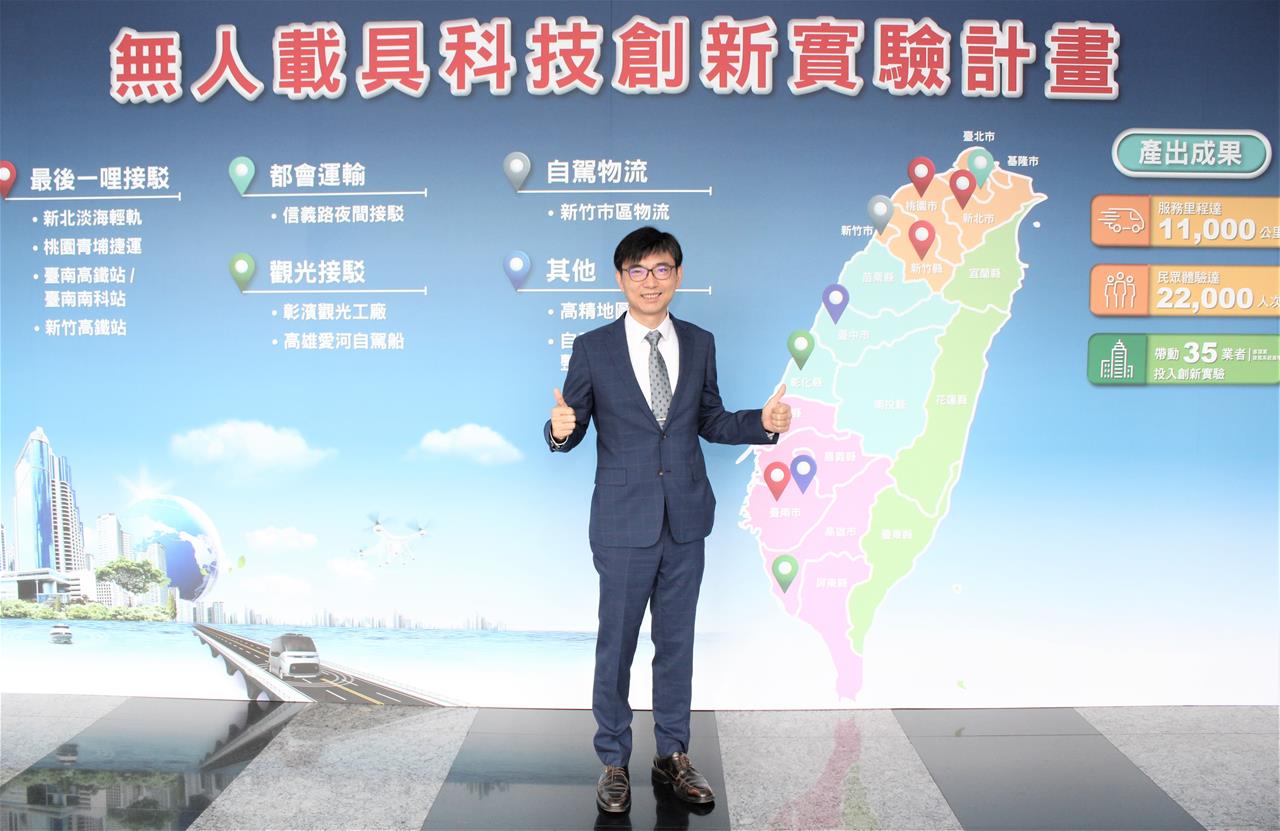
The vigorous development of AI and IoT, and the commercialization of 5G are rapidly changing the way we live. Governments are accelerating the promotion of industrial innovation and seizing emerging business opportunities. Among which, various innovative technologies, applications, and services derived from emerging smart vehicles have become a focus of global development. Under this trend, the MOEA, with the guidance of the Office of Science and Technology, Executive Yuan, began promoting the acceptance of applications from domestic companies for the Unmanned Vehicle Technology Innovative Experimentation Program in October 2019. So far, 11 innovative experiments were promoted, covering public transportation in Taipei, New Taipei, Taichung, and Tainan; short-distance and sightseeing shuttles in Hsinchu and Changhua counties; self-driving logistics vehicles in Hsinchu City; and self-driving boats for touring Kaohsiung's Love River. Various services and operating models that serve local needs were developed through the promotion of the program. A total of 35 self-driving system companies, operators, research institutions, and universities participated. The experiments serviced more than 11,000 kilometers and more than 22,000 people experienced the services.
The Unmanned Vehicles Technology Innovative Experimentation Program Office, Metal Industries Research & Development Centre (MIRDC), and Institute for Information Industry, with guidance from the Department of Industrial Technology (DoIT), MOEA, together held the 2021 Unmanned Vehicles Technology Innovative Experimentation Achievements Presentation on November 1, 2021 at the NTUH International Convention Center to showcase the results of promoting the program. The eight units, namely the Industrial Technology Research Institute, Automotive Research & Testing Center, Ship and Ocean Industries R&D Center, TURING Drive Inc., THI Consultants Inc., LILEE SYSTEMS CO., LTD, and National Cheng Kung University, that participated in the innovative experiments were invited to share their experiences. Over 100 participants from domestic industries, the government, academia, and research jointly discussed the opportunities and challenges of Taiwan's development of unmanned vehicles. The event was also broadcasted live.
Chiou Chyou-Huey, Director General of DoIT, MOEA, said that diverse applications and services have already resulted from the unmanned vehicle experiment program, including public transportation in metropolitan areas, last-mile shuttle services, sightseeing buses, self-driving logistics vehicles, and high-precision mapping. The Changbing tourist shuttle is the first case in Taiwan, as well as an experiment for the longest self-driving route. The driverless WinBus, developed by domestic companies in combination with a technology development program, shuttles passengers to and from four major tourism factories located in Changbin Industrial Park, changing the image of factories located in a traditional industrial area. The Taipei City Xinyi Road self-driving bus project demonstrates the application of Taiwan's unmanned vehicle technology to nighttime operations, offering rides to those who need it after the last MRT train and late at night. Moreover, the Kaohsiung Love River self-driving boat project highlights the features of touring the Love River through the experience of self-driving boats. Taiwan is already equipped with great conditions for developing unmanned vehicles. MOEA created a plan for development from innovative experiments to empirical operations, providing domestic companies with unmanned vehicles to develop innovative services. At the same time, technology programs are utilized to support the research and development of key unmanned vehicle technologies to develop integrated solutions through combining technology with services. These solutions make living in Taiwan more convenient and will also drive the next wave of growth and exports for Taiwan's vehicle, self-driving system, semiconductor, information technology and communication, and sensor industries.
The projects also demonstrated their innovative service features during the event. For example, the Taichung Shui Nan project pioneered a cyber-physical simulation and combined it with a smart and connected road to run smoothly on Zhongke Road, where cars and scooters can run on the same lanes. The Hsinchu County High Speed Rail self-driving shuttle service program built smart collision avoidance and smart bus stops to provide shuttle services between the Hsinchu High Speed Rail Station and the city. National Cheng Kung University also utilized the experimentation program to collect high-precision map information of Tainan's Guiren District as a reference for transportation planning and travel services for the area around the Tainan High Speed Rail Station. Last, the Hsinchu City self-driving logistics service project is the first case of a large-scale logistics operator's attempt at developing innovative operating models with self-driving cars.
According to MOEA, the Unmanned Vehicles Technology Innovative Experimentation Act temporarily exempts Taiwan's industry from laws and regulations in designated open fields for conducting innovative experiments. The act is also the world's first for unmanned vehicle experiments, covering land, sea, and air. We hope that unmanned vehicle experiments can take unmanned vehicles to the road in Taiwan faster to help upgrade the unmanned vehicle industries for domestic cars, vessels, and aviation. From experiments to market operations, unmanned vehicles will not only drive the next wave of industrial development, but also make life more convenient.